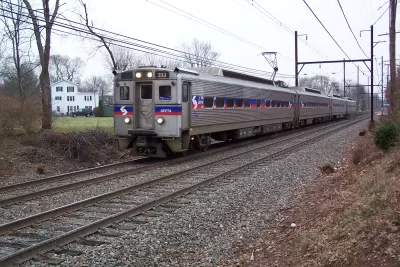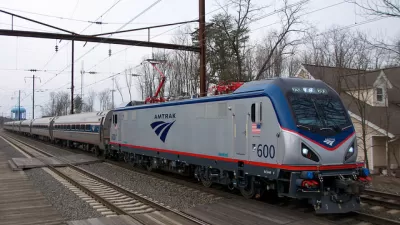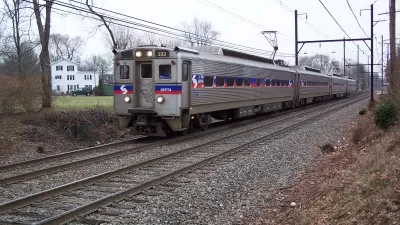A plan to get a SEPTA Regional Rail link to Phoenixville in record time has its skeptics, but advocates are convinced they can make it happen.

Phoenixville is a Pennsylvania Rust Belt town that bounced back from deindustrialization and today is home to craft breweries and mixed-use development. Now it wants to give itself a boost by connecting the town to SEPTA Regional Rail service.
A new proposal outlines a plan to get service up and running within 18 months of stakeholders agreeing to move forward. Jim Saksa explains that kind of schedule for a transportation project is unusual:
That would be nothing short of revolutionary in the world of public infrastructure, where projects are planned decades in advance and costs often grow like boa constrictors let loose in the Everglades, swelling to terrifying dimensions and strangling all they run across.
The pilot project calls for using Norfolk Southern freight tracks to connect Phoenixville to an existing SEPTA line. The projected cost for three barebones stations—just parking lots and platforms—and infrastructure upgrades is $15 million, with another $3 million a year to run the trains.
Critics of the plan say the cost estimates for building the stations and renting rails, rolling stock, and dual-mode locomotives are unrealistic. In addition, mixing freight and passenger service poses additional challenges.
Still the residents of Phoenixville are optimistic they can pull it off. "That’s an attitude born of Rust Belt rebirth -- the feeling that not all lost causes are lost, that through pluck and luck and some smalltown gumption, even the impossible is possible," observes Saksa.
FULL STORY: A long-shot plan to extend Regional Rail to Phoenixville could revolutionize how infrastructure is built

Planetizen Federal Action Tracker
A weekly monitor of how Trump’s orders and actions are impacting planners and planning in America.

Congressman Proposes Bill to Rename DC Metro “Trump Train”
The Make Autorail Great Again Act would withhold federal funding to the system until the Washington Metropolitan Area Transit Authority (WMATA), rebrands as the Washington Metropolitan Authority for Greater Access (WMAGA).

The Simple Legislative Tool Transforming Vacant Downtowns
In California, Michigan and Georgia, an easy win is bringing dollars — and delight — back to city centers.

The States Losing Rural Delivery Rooms at an Alarming Pace
In some states, as few as 9% of rural hospitals still deliver babies. As a result, rising pre-term births, no adequate pre-term care and "harrowing" close calls are a growing reality.

The Small South Asian Republic Going all in on EVs
Thanks to one simple policy change less than five years ago, 65% of new cars in this Himalayan country are now electric.

DC Backpedals on Bike Lane Protection, Swaps Barriers for Paint
Citing aesthetic concerns, the city is removing the concrete barriers and flexposts that once separated Arizona Avenue cyclists from motor vehicles.
Urban Design for Planners 1: Software Tools
This six-course series explores essential urban design concepts using open source software and equips planners with the tools they need to participate fully in the urban design process.
Planning for Universal Design
Learn the tools for implementing Universal Design in planning regulations.
Smith Gee Studio
City of Charlotte
City of Camden Redevelopment Agency
City of Astoria
Transportation Research & Education Center (TREC) at Portland State University
US High Speed Rail Association
City of Camden Redevelopment Agency
Municipality of Princeton (NJ)




























